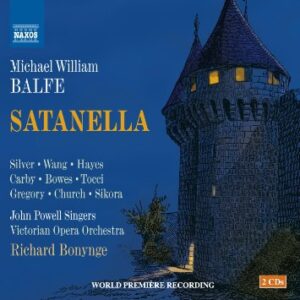Please let me make clear that the words “light opera” usually make me cringe, but from the finely orchestrated three-minute overture, which starts demonically, goes straight to sweetly angelic music, and just decides to be tuneful and introductory, this work—silly, campy, and unbelievable as it is—has won me over completely. Easy, charming tunes, choruses of party goers/demons/pirates/bridesmaids/spirits, and whopping ensembles, all of them brief and catchy, turn Satanella into a sheer delight.
Rumor—and the notes accompanying this release—has it that the first performance of this opera, Balfe’s 23rd, took more than four hours. This 112 minutes, which omits the spoken dialogue and illegible pages of the score and adheres to the cuts the composer himself made, is just enough. Fans of Gilbert & Sullivan will feel a certain familiarity with the melodies and ensembles, and the style is very much a product of its period: Victorian England. (It sometimes sounds wonderfully like dumb Donizetti.)
The plot (offered in the booklet in a somewhat inadequate synopsis, while the entire libretto is available online) is a hoot. Count Rupert is engaged to Princess Stella, but he is in love with his foster sister, Leila. (His servant, Karl, is also in love with Leila.) Trouble ensues and Rupert gambles away his fortune. He prays to demonic powers, and Demon king Arimanes and his handmaiden, Satanella, come to ruin him; but Satanella falls in love with him. Somehow, Satanella takes Leila’s place at the wedding ceremony, but a thunderbolt strikes her down and Act 2 ends.
Satanella apologizes to Arimanes and agrees to destroy Rupert within 30 days. Stella arranges for Leila to be carried away by pirates. Soon Leila is being sold at a Tunisian (?) slave market (with a politically incorrect text that offers “Circassians” and “a Negro” and a “Nubian” for sale!); with Satanella’s help, Rupert wins the bidding for Leila, but he signs away his soul. On the next Rupert/Leila wedding day, Satanella first demands that he dump Leila but is so moved by the couples’ love that she frees Rupert from his pact. Leila gives Satanella a rosary and the latter is transported to heaven as the happy foster-siblings are wed.
Richard Bonynge is the knowledgable, loving conductor, and this is his performing edition. All of the singers, including the chorus, are light-voiced. I adore the fact that the John Powell Singers (the chorus) sound equally beautiful, all the voices pure and on the breath, whether they are party guests, pirates, or demons. Characterization, bah, although the few pirates are loud. The Victorian Opera Orchestra is mellow and/or colorful, as need be. The harpist desrves an award of some kind.
After a brief appearance in ensemble, Satanella herself is introduced with a recit and gorgeous cavatina accompanied by flute, harp, and crooning offstage chorus (are they mellifluous demons?), which continues as a duet seduction of Rupert. Sally Silver is our Satanella and she has plenty to do. A high soprano role with plenty of coloratura, Silver fills it delightfully with an operetta-like voice that turns marvelously paint-peeling on interpolated high notes.
The Rupert of Kang Wang is hard to describe: the role is major and has plenty of solos and work in duets. His high notes—up to a distressing D—are solid but have to be heard to be believed; there is something about his sound above the staff that, let’s say, you won’t soon forget. But his sincerity is never in doubt.
All of the other characters are underdeveloped. Leila, like her pure and loving character, is purely and lovingly sung by Catherine Carby. Arimanes, the wicked demon king, is nicely sung and characterized by bass Trevor Bowes; Anthony Gregory makes the most of his fine aria as Karl; and Frank Church, as Bracaccio, the leader of the Pirates, is as menacing as a miniature poodle.
There are eight separate scene changes including a Cavern, a Demon’s Tower, a sea coast, and a slave auction—this must be great fun to see. At its premiere, aside from some complaints about its length and spoken dialogue, the Covent Garden audience loved it and it received 57 performances that season.
In a cut-and-sliced version, even with some interstitial dialogue to clarify the plot, I would love to see a tongue-in-cheek production of this opera. Until then I will listen to these CDs a great deal, even with the occasionally silly singing, impeccable manners, goopy waltz songs, and weeping cello solos.
































